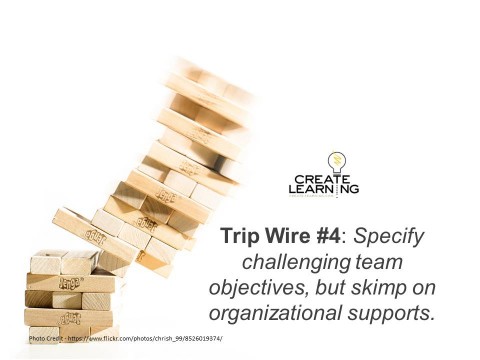
In an earlier post, I share ‘5 Trip Wires in Designing and Leading Teams’
This post looks at:
Trip Wire #4: Specify challenging team objectives, but skimp on organizational supports.
There is no right way to create and sustain a team.
Even when the team has a clear purpose and enabling structure, the team performance can still turn dysfunctional.
I’ve worked with high-performing teams that fell apart when given “stretch” objectives, but they never received the organizational support to achieve them. The team enthusiasm and manager’s perception of a great team quickly deflates into conflict, confusion, nonalignment, and missed deadlines.
For teams to achieve capacity, organizational supports and systems must actively support teamwork.
Key Supports for Teams
- Recognition and reward system that reinforces team (not merely individual) performance
- Education system that provides teams whatever training, development and technical consultation they need to supplement member knowledge and expertise
- Information systems that makes available to the team data and forecasts members need to manage their work
- Material Resources – equipment, tools, space, money, staff, etc.. – what the team needs to execute on their tasks.
Team supports can be paradoxical in organizations that are designed to support individual work.
- Compensation and bonus policies may have no provision for team bonuses.
- Human Resources departments may be focused on individual needs and provide courses to fill individual needs – but team skills may not be available at all.
- Performance appraisal systems, which may be state of the art for measuring individual contributions, are probably inappropriate for looking at work done by teams.
- Information systems may provide managers data to monitor work processes, but they may not be available or appropriate for the work done by teams.
- Resources required to complete the work may have been determined by the individual and there may be no procedure in place for a team to secure a special configuration or resources it needs to complete a particular performance strategy it has developed.
To provide organizational support for teams, managers have to be astute and have the authority to make requests upward and laterally. Managerial colleagues may not accept suggestions to revise the systems they have developed and are comfortable with or release resources to teams – resources that others in the organization also seek.
An organizational system to support teams is noticeably different from a system intended to support and control individual work.
Systems-Drive-Behavior
A team will lose energy, and stories that reinforce good or bad teamwork will emerge from how an organization designs these supports. When a team is excited about its work and all set to implement, failure is shattering because the organizational support required cannot be obtained.
What do you think?
What supports does your team have? How are supports for a team and individual different?

